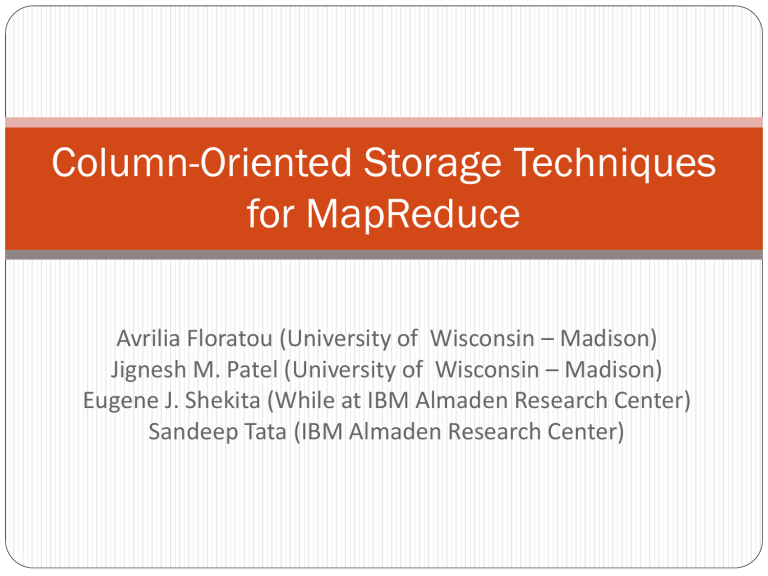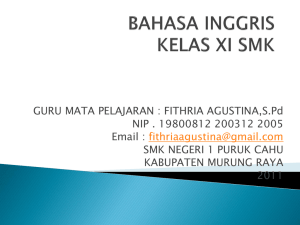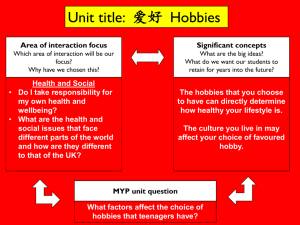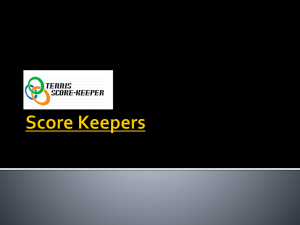Column-Oriented Storage Techniques for MapReduce
advertisement

Column-Oriented Storage Techniques
for MapReduce
Avrilia Floratou (University of Wisconsin – Madison)
Jignesh M. Patel (University of Wisconsin – Madison)
Eugene J. Shekita (While at IBM Almaden Research Center)
Sandeep Tata (IBM Almaden Research Center)
1
Motivation
Column – Oriented
Storage
Databases
Performance
2
MapReduce
Programmability
Fault tolerance
Challenges
How to incorporate columnar–storage into an existing
MR system (Hadoop) without changing its core parts?
How can columnar-storage operate efficiently on top
of a DFS (HDFS)?
Is it easy to apply well-studied techniques from the
database field to the Map-Reduce framework given
that:
It processes one tuple at a time.
It does not use a restricted set of operators.
It is used to process complex data types.
3
Outline
Column-Oriented Storage
Lazy Tuple Construction
Compression
Experimental Evaluation
Conclusions
4
Column-Oriented Storage in Hadoop
Eliminate unnecessary I/O
Name
Name
Joe
Joe
Name
Age
Info
Joe
23
“hobbies”: {tennis}
“friends”: {Ann, Nick}
David
32
“friends”: {George}
John
Smith
32
32
Info
“hobbies”:
“hobbies”:{tennis}
{tennis}
“friends”:
{Ann, Nick}
Nick}
“friends”:{Ann,
“friends”: {George}
{George}
“friends”:
1st node
David
45
“hobbies”: {tennis, golf}
65
“hobbies”: {swimming} 2nd node
“friends”: {Helen}
Name
Name
Age
Age
Info
Info
John
John
4545
“hobbies”:
{tennis, golf}
“hobbies”:{tennis,
golf}
Smith
Smith
65
65
“hobbies”: {swimming}
“hobbies”: {swimming}
“friends”: {Helen}
“friends”: {Helen}
Introduce a new InputFormat :
ColumnInputFormat (CIF)
5
David
Age
23
23
Replication and Co-location
Name
Age
Joe
23
Info
“hobbies”: {tennis}
“friends”: {Ann, Nick}
David
32
“friends”: {George}
John
45
“hobbies”: {tennis, golf}
Smith
65
“hobbies”: {swimming}
“friends”: {Helen}
Node A
Node B
Name
Age
Info
Joe
23
David
32
“hobbies”: {tennis}
“friends”: {Ann,Nick}
“friends”:{Ann,
Nick}
“friends”: {George}
{George}
Node C
Node D
HDFS
Replication
CPP
Policy
Introduce a new column placement policy (CPP)
6
Example
Map
Method
if (age < 35)
return name
Record
Age
7
Name
23
Joe
32
45
David
John
30
Mary
50
Ann
What if age > 35?
Can we avoid reading
and deserializing the
name field?
Outline
Column-Oriented Storage
Lazy Tuple Construction
Compression
Experiments
Conclusions
8
Lazy Tuple Construction
Mapper ( NullWritable key, LazyRecord
value)
Record value)
{
String name;
int age = value.get(“age”);
if (age < 35)
name = value.get(“name”);
}
Deserialization of each record field is deferred to the point where it
is actually accessed, i.e. when the get() methods are called.
9
Skip List (Logical Behavior)
Skip 100 Records
R1
R100
Skip 10
R1
R1
10
R2
...
R10
R20
...
R90
R10
R20
...
R90
R100
...
R99
R100
Example
Name
if (age < 35)
return name
0
1
2
Skip10 = 1002
Skip100 = 9017
Joe
Age
David
23
…
39
45
…
Skip Bytes
Skip 10 = 868
102
11
100 rows
Jane
…
…
30
10 rows
Mary
Ann
John
10 rows
Example
if (age < 35)
return hobbies
Age
23
39
45
…
Info
Skip10 = 2013
Skip100 = 19400
“hobbies”: tennis
“friends” : Ann, Nick
“friends” : George
10 rows
…
100 rows
Null
…
Skip 10 = 1246
30
…
“hobbies”: tennis, golf
12
…
10 rows
Outline
Column-Oriented Storage
Lazy Record Construction
Compression
Experiments
Conclusions
13
Compression
Dictionary Compressed
Skip Lists
Compressed Blocks
Dictionary
“hobbies” : 0
“friends” : 1
# Records in B1
B1
LZO/ZLIB
compressed block
Skip10 = 210
Skip100 = 1709
Skip
Bytes
RID : 0 - 9
1: {George}
B2
RID : 10 - 35
14
10 rows
…
# Records in B2
LZO/ZLIB
compressed block
0 : {tennis}
1 : {Ann, Nick}
100 rows
Null
…
Decompress
Skip 10 = 304
…
0: {tennis, golf}
10 rows
Outline
Column-Oriented Storage
Lazy Record Construction
Compression
Experiments
Conclusions
15
RCFile
Metadata
Joe, David
16
Name
Age
Info
Joe
23
“hobbies”: {tennis}
“friends”: {Ann, Nick}
David
32
“friends”: {George}
John
45
“hobbies”: {tennis, golf}
Smith
65
“hobbies”: {swimming}
“friends”: {Helen}
Row
Group 1
23, 32
{“hobbies”: {tennis}
“friends”: {Ann, Nick}},
{“friends”:{George}}
Metadata
John, Smith
Row
Group 2
45, 65
{“hobbies”: {tennis, golf}},
{“hobbies”: {swimming}
“friends”: {Helen}}
Experimental Setup
42 node cluster
Each node:
2 quad-core 2.4GHz sockets
32 GB main memory
four 500GB HDD
Network : 1Gbit ethernet switch
17
Overhead of Columnar Storage
Single node experiment
4000
3500
Time (sec)
3000
2500
2000
1500
1000
500
0
18
Synthetic Dataset
57GB
13 columns
6 Integers, 6 Strings, 1 Map
Query
Select *
Benefits of Column-Oriented Storage
2000
Single node experiment
1800
1600
CIF
Time (sec)
1400
CompRCFile
1200
UncompRCFile
1000
800
Query
Projection of different
columns
600
400
200
0
All Columns
19
1 Integer
1 String
1 Map 1 String / 1 Map
Workload
Schema
Query
URLInfo
{
String url
String srcUrl
time fetchTime
String inlink[]
Map <String,String[]> metadata
Map <String, String> annotations
byte[] content
}
If( url contains “ibm.com/jp” )
find all the distinct
encodings reported by the page
Dataset : 6.4 TB
Query Selectivity : 6%
20
Comparison of Column-Layouts (Map phase)
120
107,8
100
Speedup over SEQ
(map phase)
SEQ: 754 sec
81,9
80
60,8
60
40
20
1
3,7
SEQ
Compressed
RCFile
0
21
CIF
CIF -SL
CIF-DCSL
Comparison of Column-Layouts (Map phase)
3040
120
120
107,8
102
81,9
80
60,8
60
40
20
75
80
61
60
40
20
1
3,7
SEQ
Compressed
RCFile
0
22
96
100
Data Read (GB)
Speedup over SEQ
(map phase)
100
CIF
CIF -SL
CIF-DCSL
0
SEQ
Compressed
RCFile
CIF
CIF -SL
CIF-DCSL
Comparison of Column – Layouts (Total job)
14
12,8
11,5
12
Speedup over SEQ
(Total Job)
10,3
SEQ: 806 sec
10
8
6
4
2
2,8
1
0
SEQ
23
Compressed
RCFile
CIF
CIF -SL
CIF-DCSL
Conclusions
Describe a new column-oriented binary storage
format in MapReduce.
Introduce skip list layout.
Describe the implementation of lazy record
construction.
Show that lightweight dictionary compression for
complex columns can be beneficial.
24







